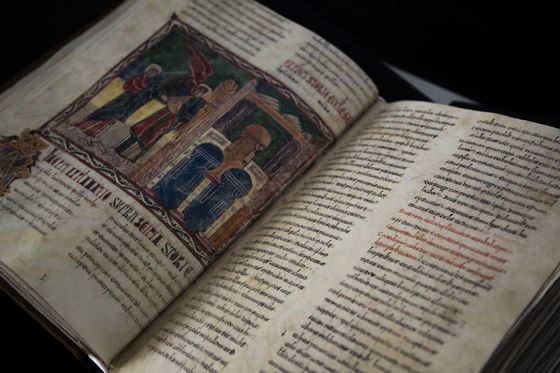home > articles > IS PRETERISM BIBLICAL?
IS PRETERISM BIBLICAL?
 Preterism comes the Latin word ‘praeter’ which means ‘the past’. When it comes to understanding Bible prophecy all Christians are preterists to one degree or another. It is only logical and reasonable to examine the past to see if a prophecy has already been fulfilled. Most Christians would acknowledge that Isaiah 7:14 describing a virgin giving birth has been fulfilled in the past. But not all Christians would agree about the nature of prophecies relating to Christ’s “second coming”. Preterists argue that all of the prophecies relating to Christ’s ‘coming’ (as described in Matthew 24) have already been fulfilled. This contrasts with two other schools of prophecy interpretation.
Preterism comes the Latin word ‘praeter’ which means ‘the past’. When it comes to understanding Bible prophecy all Christians are preterists to one degree or another. It is only logical and reasonable to examine the past to see if a prophecy has already been fulfilled. Most Christians would acknowledge that Isaiah 7:14 describing a virgin giving birth has been fulfilled in the past. But not all Christians would agree about the nature of prophecies relating to Christ’s “second coming”. Preterists argue that all of the prophecies relating to Christ’s ‘coming’ (as described in Matthew 24) have already been fulfilled. This contrasts with two other schools of prophecy interpretation.
Essentially there are then three general schools of eschatology:
- Futurism – the contents of Revelation pertain to the very end of time on earth.
- Historicism – that the contents of Revelation have unfolded throughout history from the time of its writing to the present day (and beyond).
- Preterism – before assuming that a prophecy is not fulfilled, it should be evaluated in the light of the past. That is, how did the original audience understand what was written to them – and what was the original intention of the text. If it can be demonstrated that a prophecy has been fulfilled in the past, then that prophecy should be considered as fulfilled prophecy.

An exact copy of Beatus of Liébana’s 460 page commentary on Revelation originally copied in A.D. 970.
Criticism of Preterism can be summarised as-
To which Preterists counter that they are actually more literal in their interpretation of Bible prophecy because they strive for the original intention of a passage rather than impose fanciful modern understandings onto an ancient text.
A COMPARISON BETWEEN
FULL-PRETERISM (PANTELISM)
&
PARTIAL-PRETERISM (PRETERISM)
|
FULL PRETERIST
|
PARTIAL PRETERIST
|
|
|
|
|
|
|
|
|
|
|
|
|
|
|
|
|
Why I am not a Full Preterist…
-
There are reasonable grounds for regarding Matthew 24 as being entirely fulfilled, but Matthew 25 as current-and-yet-to-come.
-
There is enough evidence to make a case for Satanic/Demonic activity still today which torpedoes any possibility of Full Preterism being correct. This demands that the “1000 years” of Revelation 20 commences after 70 AD.
-
All through Revelation up to chapter 19 the Full Preterist rightly argues that the locus foci of God’s judgment was Jerusalem (the seat of wicked Judaism) which is referred to as ”Sodom, Egypt, Bablyon, the Harlot”. But in Rev. 20.9 the locus foci shifts to “the camp of saints” also called “the beloved city”. This contrasts sharply with how the rest of Revelation has described Jerusalem. It is therefore unreasonable to consider Rev. 20:9 as referring to earthly Jerusalem. This demands that Revelation 20 continues on from chapter 19 rather than a reiteration of the vision commenced from chapter 6.
-
Scholars disagree about the exact point in Revelation of Christ’s coming. Some appeal to Revelation 19 which describes the Rider of the White Horse coming in judgment as the coming of Christ to consummate time. Curiously there is no mention of fire in this passage (note 2Thess. 1:8). It is therefore very reasonable to equate the revelation of Christ from Heaven with Rev. 20:9 which describes fire coming down from Heaven.
-
If Full Preterism was obvious to the First Century Christians, most especially the author of the Book of Revelation, John the Apostle, there would reasonably be some written record of this interpretation by them. However, we have no such interpretation promoted by First or Second Century Church Fathers. Yet, we have the record of both Polycarp and Irenaeus who have direct and second degree (indirect connection) with the Apostle John. What we do find is references from the Ante-Nicean Church Fathers to the expectation that Christ would return, and the God would culminate time with a Judgment Day. We also find supporting references from several Ante-Nicean and Post-Nicean Fathers supporting the Partial (Classical) Preterist position whereby they acknowledge that the destruction of Jerusalem was the fulfilment of Matthew 24.

Dr. Andrew Corbett preaching in Budapest Free Christian Church, Sunday 20 September 2018
My views are more fully explained in my eBook, The Most Embarrassing Book In The Bible, where I go through the Book of Revelation and explain it chapter by chapter.
Andrew Corbett










































Is there a definitive website for Partial Preterism? I am more inclined toward partial than full, and would like a definitive, all-encompassing place to study. Or, is there a book?
Hopefully, you’ll find a trove of study resources on this site which would enable you to understand why Partial Preterism is an accurate way for understanding Biblical Eschatology. Apart from my book, The Most Embarrassing Book In The Bible, you will find authors such as RC Sproul have also written eschatological books from a Partial Preterist perspective.
I have been watching telecasts from a pastor who teaches full preterist beliefs. I accept most as truth because Yeshua Christ did tell his deciples that some would still be alive when he came again and that it would be soon (easily seems like maybe 40 years maximum) but also if He did return circa AD70, are their any post Bible scripts available to show this happened? I understand the canon of the church which decided which manuscripts were deemed divine but why were no AD200+ writings included? I am seeking only truth in understanding God’s will and sharing it, I have no other agenda. God bless
Hi Wayne. I am not a Full-Preterist as I do not see that it comports with either the Biblical or historical data. I believe there are good reasons for understanding the term “coming” to mean God’s judgment, and should not be eisegetically understood to mean “return”. Christ therefore came in judgment in A.D. 70, but is yet to return.
-A.
Thanks for your reply. It makes sense too. The full Preterist stand leaves me with questions but the concept you consider that Christ came in AD70 but that was not the prophesied second coming? Am I reading you right? Is that part-Preterist? and is predestination by God the father at the beginning consistent! I will read more from your site. Thanks heaps.
Red letters: Preterist View
Black letters: Biblical View
Salvation is tied to eschatology. How much salvation you currently have depends on your eschatological view
Ephesians 2:8-8 For by grace you have been saved through faith; and [a]that not of yourselves, it is the gift of God; 9 not as a result of works, so that no one may boast. (no mention of an eschatological view)
This is the only place in the New Testament where the return of Christ is called a Second Coming. His appearing is said to be “for salvation.” Peter states that their salvation was not yet complete: 1 Peter 1:5 (NKJV) who are kept by the power of God through faith for salvation ready to be revealed in the last time.
Hebrews 9:28 (NASB) so Christ also, having been offered once to bear the sins of many, shall appear a second time for salvation without reference to sin, to those who eagerly await Him.
He protects us through the same faith He gave us in the beginning. The way we are saved (by faith) we will be assured to persevere. And that perseverance is for a salvation to be revealed to us in the last time. At our glorification. When we leave this body behind, we enter into the fullness of the salvation that is ours even now.
Matt. 22:1 Jesus spoke to them again in parables, saying, Matt. 22:2 “The kingdom of heaven may be compared to a king who gave a wedding feast for his son. Matt. 22:3 “And he sent out his slaves to call those who had been invited to the wedding feast, and they were unwilling to come. Matt. 22:4 “Again he sent out other slaves saying, ‘Tell those who have been invited, “Behold, I have prepared my dinner; my oxen and my fattened livestock are all butchered and everything is ready; come to the wedding feast.”’ Matt. 22:5 “But they paid no attention and went their way, one to his own farm, another to his business, Matt. 22:6 and the rest seized his slaves and mistreated them and killed them. Matthew 22:7 “But when the king heard about it, he was furious. And he sent out his armies, destroyed those murderers, and burned up their city.
What is verse seven speaking of? Yes, it very clearly is a prediction of the A.D. 70 judgment of Jerusalem.
But Israel had no faith and understanding of the coming Kingdom (because the offer was taken off the table for their unbelief) so Jesus’ offer didn’t seem worth the trouble to accept. They chose what they knew over what they didn’t………they chose their regular lives, their businesses and farms over Kingdom life. And they chose the religious system the Pharisees gave them over the freedom Jesus offered them. They turned down the freedom of grace and the joy of the Kingdom that came by faith. Like guests refusing to attend a lavish wedding…it was a crazy, foolish choice. (And after 2000 years, they still do not know what they did. But then a remnant will be saved at mid-trib and the remainder will come to faith at the end of the seven years)
The wedding guests are the ones who will take part in the 1,000 year reign (apart from the Church because she is the Bride). They are the “saints” of the Old Testament, the 144,000 Jews, the two witnesses and the people who were martyred during the reign of the Beast (because they would not worship the Beast/Antichrist and the image of the Beast), the remnant of Israel, and the nations that treated Israel with respect during the Great Tribulation.
Matt. 25:35-40 ‘For I was hungry, and you gave Me something to eat; I was thirsty, and you gave Me something to drink; I was a stranger, and you invited Me in; naked, and you clothed Me; I was sick, and you visited Me; I was in prison, and you came to Me.’ “Then the righteous will answer Him, ‘Lord, when did we see You hungry, and feed You, or thirsty, and give You something to drink?. ‘And when did we see You a stranger, and invite You in, or naked, and clothe You? ‘When did we see You sick, or in prison, and come to You?’ “The King will answer and say to them, ‘Truly I say to you, to the extent that you did it to one of these brothers of Mine, even the least of them, you did it to Me.’
The above verses are definitely referring to the Tribulation saints (Gentiles) who are huddled in Jerusalem trying to stay alive and at the same time ministering to the Jews, who are the most vulnerable to the Anti-Christ’s persecutions. They cared for the sick, gave up valuable water when supply was short, clothing when none existed and visited the persecuted Jews in prison. Such acts of mercy would have been incredibly dangerous and potentially suicidal during the Antichrist’s reign of terror.
Is God’s prophetic calendar tied to the modern-day nation of Israel? No God is through with Israel. (blasphemy!)
The religious leaders accused of Jesus acting under the influence of Beelzebub when He performed His last Messianic Miracle (one of four miracles that proved His deity put together by the Pharisees themselves) They committed the unpardonable sin, blasphemy of the Holy Spirit, which can only have been performed once in history……these charges were made about Jesus face to face (This cannot be repeated.)
The Lord prevented Israel from receiving their Messiah. They heard, but they didn’t understand. They saw, but they didn’t believe. And this was all done to fulfill prophecy in Isaiah, which said that the Messiah would be rejected by Israel. if Israel had received their Messiah when He came to deliver the Gospel, then the Lord would have been obligated to receive them according to His promises. As Isaiah said, if Israel heard the message and receive it, then the Lord would heal them.
God needed a just way to reject His own people for a time for their sin of rejection in order to permit the opportunity for the Gentile nations to receive the Messiah He promised them through the Abrahamic Covenant when He said —
“I will make you into a great nation, and I will bless you; I will make your name great, and you will be a blessing. I will bless those who bless you, and whoever curses you I will curse; and all peoples on earth will be blessed through you.” Genesis 12:1.
If you were to die right now, where would you go? That depends on your eschatology. No one goes to heaven prior to the second coming.
Mr. Curtis is right in his statement that no one goes go heaven prior to the second coming of our Lord. However, scripture tells us that no one will be in what we call heaven (the throne room of God) until after the Kingdom is come and gone. (1000) years of Jesus’s reign on this earth. Those saints who have gone on are in Paradise with Jesus. Then the natural people out of the kingdom who did not die at the end along with the glorified saints (us and the Jewish nation who will reign with Him) will receive their glorified bodies, (Jews and gentiles alike) Then the earth, and everything celestial, will be destroyed all those who have accepted the finished work of Jesus on the cross are ushered into a New Heaven and a New Earth……
Israel – Who is the true Israel today? What do you do with the modern day nation of Israel? Is God’s prophetic calendar tied to the modern day nation of Israel? No God is through with Israel.
Jesus came in judgment on the nation Israel in A.D. 70; ending forever the nation, its physical temple and sacrifices. So, God is through with Israel, but most Christians think that the Jews are God’s special people and must be protected. A faulty eschatology is affecting our foreign policy.
Yes, He did come in judgement of Israel in 70A.D. The Mosaic Covenant gone into with both parties, God and Israel, making promises and stipulations, was broken many times. The Jews have always been a stubborn, stiff-necked people. They follow God for a while, then run off course to the extent of severe discipline. This prophecy has not been fulfilled but will be in the Kingdom. Israel has never been a great nation, nor have they ever occupied all the land God showed Abram in the Abrahamic Covenant. These things are promised to God’s chosen people with whom He will NEVER be finished…….
Also, the answer to the temple sacrifices will be during the Tribulation, this will again be given back to Israel, only to be destroyed again. Then during the 1000 reign of the Kingdom, sacrifices will again be offered up in their temple. (I know—read about that in Ezekiel 40-48) It describes a temple that will exist in the Millennium. Earlier in Ezekiel God promised that He would establish His sanctuary, or temple forever. Since there is no temple today, we know that this prophecy has not occurred yet. And I will make a covenant of peace with them; it will be an everlasting covenant with them. And I will place them and multiply them, and will set My sanctuary in their midst forever. Ezekiel 37:26
How can we even speculate that God is finished with Israel? The whole bible is inundated with Him calling them His people!
Peter states that their salvation was not yet complete: 1 Peter 1:5 (NKJV) who are kept by the power of God through faith for salvation ready to be revealed in the last time. Salvation was ready to be revealed, when? In the last time, which would happen at the return of Christ. If Christ has not returned, salvation is incomplete, and no one has yet gone to heaven. Salvation is never incomplete. Either it is or it isn’t…….
He protects us through the same faith He gave us in the beginning. (the way we’re saved by faith). We will be assured to persevere (by faith) And that perseverance is for a salvation to be revealed to us in the last time At our glorification. When we leave this body behind, we enter into the fullness of the salvation with our resurrected bodies.
John says we are blessed if we have a part in this first resurrection, because it means we are blessed to be included in God’s family, To have a part reflects the fact that the first resurrection takes place in parts over time. The first part of the first resurrection was Christ’s own resurrection. Following Christ, the Church saints are the next to receive new bodies at the Rapture. After us, the Two Witnesses are resurrected at the middle of Tribulation. Finally, the Tribulation saints along with the Old Testament saints, are resurrected at the end of Tribulation. Collectively, these resurrections are all part of the first resurrection.
Matthew 24:34 (NKJV) “Assuredly, I say to you, this generation will by no means pass away till all these things take place.
Jesus, here, very plainly and very clearly, tells His disciples that ALL of the things He had mentioned would come to pass in THEIR GENERATION. If you study the context, you will see that this includes the gospel being preached in all the world, the abomination of desolation, the great tribulation, and the Second Coming of Christ. This is so clear that it greatly troubles those who hold to a futuristic eschatology.
For a time, Israel will appear lifeless, because the nation will be outside its land for centuries and many will conclude it is dead. The establishment of the nation came about as a result of years of work by the Zionist Congress to establish the nation, The Zionist movement started at the end of the 19th Century, and continued through the first half of the 20th Century. The 1948 declaration of independence merely formalized what had been already true for decades: Israel was back from the dead.
He says that this generation will not pass away until “all these things” take place. This promise has been a source of considerable confusion and misinterpretation in the Church.
A common interpretation for a time said that Once Israel became a nation, the end times would play out within a generation. But it’s been over 100 years since Zionism began and 80 years since Israel became a nation, which is far too long. A second interpretation says Jesus was speaking of the generation alive in Tribulation; that this generation will not die out before the end. But that’s a pointless statement since Daniel already told us Tribulation is seven years, far less than a generation. There would be no reason for Jesus to give us this promise if He were merely repeating Daniel’s timeline.
First, Jesus said “all” the things He described would come to pass while this “generation” existed, not just some of the things He described. Clearly, Jesus isn’t referring to a single human generation, for no human generation lasts that long. which leads us to the second key to interpreting Jesus’ words. We notice that Jesus said “this generation” not merely “a generation”. What He means by “generation” and we understand the meaning by looking at the Greek word in v.34 is that the word can also be translated as family, kind or tribe, so by the context, that’s how we should interpret the word. He was speaking of the entire nation as a new generation of Israel, not merely one birth generation. (from the time they began coming back to the land in 1948 until the SECOND COMING.) – THE VERY END. When we see the verses in this light, all the things prophesied after that will definitely come to pass during the tribulation!
Christ’s Second Coming occurred spiritually — the way He intended it — at the A.D. 70 destruction of Jerusalem. This highly verified historical event signified that sin finally had been atoned forever and that all Christians, from generation to generation, could live eternally — on earth and in heaven — without separation from God.
I hardly know how to answer the above statement! Where is the teaching of Jeremiah, Daniel, Isaiah, Ezekiel and last but not least Revelation???
The chart below is a timeline of events from the Rapture to Heaven. One must have a pretty good understanding of the whole counsel of God to see that it is correct…….
“Assuredly, I say to you, this generation will by no means pass away till all these things take place. Matthew 24:34. AND
“But of that day and that hour knoweth no man, no, not the angels which are in heaven, neither the Son, but the Father.” Mark 13:32
What a pity and a shame that these two above verses have been so misunderstood throughout the last 2000 years that much unnecessary rhetoric has been tossed to and froe to deceive so many believers as well un unbelievers!!!
God shows us how Jesus’s coming for His church at the Rapture by giving us a euphemism concerning the Groom, Bride and how they are brought together in the early culture of Israel.
A bride was selected for the groom by the groom’s father, usually by way of a servant or relative. Then, a price would be paid for the bride and she would be betrothed through an exchange of gifts and a meal with a cup of wine. The bride would remain at her own home, waiting for the groom to come claim her on an unspecified day in the future. The groom spent the time building an addition onto his father’s home for he and his bride. Meanwhile, the bride for her part, is readying herself for the groom, making herself beautiful and preparing to greet him. When the house was ready, the father gave the order for the groom to claim his bride. The groom was never privy to this date…….
John 14:2 In my Father’s house are many mansions: if it were not so, I would have told you. I go to prepare a place for you.
When Jesus said He was going away to prepare a place for us at His Father’s house, He was invoking Jewish marriage tradition. He is our Groom, and we are His Bride. We are betrothed to Him and await His return. Meaning, the “building” that is happening is not one of building rooms, but rather building a Bride. Once the building process is complete, then the Groom will return.
You can find a wonderful example of this process in Genesis 24 in the stories of Abraham, Isaac and Rebekah.
Nowhere do the Scriptures teach that the physical creation will be destroyed.
Notice what God said after the flood of Noah’s day: Genesis 8:21 (NKJV) And the LORD smelled a soothing aroma. Then the LORD said in His heart, “I will never again curse the ground for man’s sake, although the imagination of man’s heart is evil from his youth; nor will I again destroy every living thing as I have done.
Rev. 21:1-4 says, Then I saw a new heaven and a new earth; for the first heaven and the first earth have passed away.
There could be so much more said about these days. However, a good dose of sound doctrinal teaching will emphasize how this all comes about with a study of Revelation and how it invariably relates to the Old Testament prophets concerning the end times.
The epistle of Judi 😃
Zionist fool. The people occupying Palestine are the synagogue of Satan under the flag of Remphan – the symbol of Moloch their god. They are 7th century Ashkenazim converts from khazaria. The ashkenazim are descended from Japheth, not Shem so cannot be Jacobites as they claim.